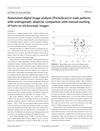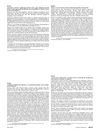 May 2024 in “Clinical Cosmetic and Investigational Dermatology”
May 2024 in “Clinical Cosmetic and Investigational Dermatology” Manipulating cell cleanup processes could help treat hair loss.
 1 citations,
May 2017 in “InTech eBooks”
1 citations,
May 2017 in “InTech eBooks” Some natural remedies may help with hair regrowth, but more research is needed to confirm their effectiveness and safety.
3 citations,
August 2018 in “Stem cells international” Hair follicle cells help maintain and support stem cells and blood cell formation.
1 citations,
November 2023 in “Journal of Ayurveda and Integrative Medicine” Ashwagandha serum improves hair health and quality of life in people with hair loss.
 10 citations,
June 2019 in “International Journal of Cosmetic Science”
10 citations,
June 2019 in “International Journal of Cosmetic Science” Some plant-based chemicals may help with hair growth, but more research is needed to confirm their effectiveness.
 30 citations,
September 2016 in “BMJ”
30 citations,
September 2016 in “BMJ” Taking 5-α reductase inhibitors for prostate enlargement or hair loss does not significantly raise the risk of erectile dysfunction.
 13 citations,
January 2020 in “Nanoscale”
13 citations,
January 2020 in “Nanoscale” Finasteride and baicalin in phospholipid vesicles effectively promote hair growth and increase follicle count.
 2 citations,
April 2014 in “International Wound Journal”
2 citations,
April 2014 in “International Wound Journal” The V-Y-S plasty is a safe and effective one-stage method for repairing medium to large scalp defects.
 212 citations,
September 2008 in “Journal of The American Academy of Dermatology”
212 citations,
September 2008 in “Journal of The American Academy of Dermatology” Minoxidil and finasteride treat hair loss in men, while minoxidil treats hair loss in women.
 59 citations,
July 2020 in “Journal of The American Academy of Dermatology”
59 citations,
July 2020 in “Journal of The American Academy of Dermatology” Oral minoxidil promotes hair growth but may cause side effects; needs monitoring.
 15 citations,
January 2010 in “Experimental Dermatology”
15 citations,
January 2010 in “Experimental Dermatology” Hair loss in certain young mice is linked to a specific gene and can be caused by lack of iron.
 9 citations,
September 2006 in “Clinical Pediatrics”
9 citations,
September 2006 in “Clinical Pediatrics” Pediatricians should treat some hair loss types in children and refer others to a dermatologist.
 5 citations,
January 2018 in “Skin Research and Technology”
5 citations,
January 2018 in “Skin Research and Technology” TrichoScan needs optimization as it underestimated hair density by 38.9% compared to manual counting.
 5 citations,
November 2017 in “Asian journal of pharmaceutical and clinical research”
5 citations,
November 2017 in “Asian journal of pharmaceutical and clinical research” Pakis Gajah (Angiopteris evecta) water extract may promote hair growth in rabbits, but more research is needed for human use.
 October 2023 in “Dermatology practical & conceptual”
October 2023 in “Dermatology practical & conceptual” Pulse corticosteroids help regrow hair in alopecia areata but have side effects, especially betamethasone.
 August 2023 in “Vittalle”
August 2023 in “Vittalle” Mais estudos são necessários para garantir a eficácia e qualidade dos tratamentos de alopecia com plantas medicinais.
 February 2013 in “Journal of the American Academy of Dermatology”
February 2013 in “Journal of the American Academy of Dermatology” Certain gene variations might increase the risk of a hair loss condition in Koreans.
 53 citations,
February 2020 in “Expert Opinion on Pharmacotherapy”
53 citations,
February 2020 in “Expert Opinion on Pharmacotherapy” Finasteride and minoxidil work best together for hair loss.
 12 citations,
December 2018 in “Dermatologic Therapy”
12 citations,
December 2018 in “Dermatologic Therapy” Small Botox dose effectively treats hair loss in Chinese men.
 7 citations,
January 1990 in “Clinical and Experimental Dermatology”
7 citations,
January 1990 in “Clinical and Experimental Dermatology” Hair loss gradually happens, and minoxidil helps regrow hair.
 6 citations,
November 2018 in “Journal of Critical Care”
6 citations,
November 2018 in “Journal of Critical Care” Many survivors of critical illness, especially those with sepsis, experience hair loss.
 3 citations,
January 2018
3 citations,
January 2018 Amla oil may help treat hair loss.
 2 citations,
February 2013 in “Journal of The American Academy of Dermatology”
2 citations,
February 2013 in “Journal of The American Academy of Dermatology” Platelet-rich plasma may improve hair density in androgenetic alopecia patients.
 1 citations,
April 2023 in “Clinical, cosmetic and investigational dermatology”
1 citations,
April 2023 in “Clinical, cosmetic and investigational dermatology” Antigens from skin cells may cause hair loss in perinevoid alopecia.
 1 citations,
July 2017 in “The Journal of Urology”
1 citations,
July 2017 in “The Journal of Urology” Low-dose finasteride and dutasteride reduce PSA levels by 27.8% in men with male androgenetic alopecia.
 October 2024 in “International Journal of Pharmaceutical Sciences Review and Research”
October 2024 in “International Journal of Pharmaceutical Sciences Review and Research” A 5% minoxidil spray could effectively treat male baldness with fewer side effects and better patient comfort.

Men with androgenetic alopecia may have a higher risk of metabolic syndrome.
 July 2024 in “Frontiers in Pharmacology”
July 2024 in “Frontiers in Pharmacology” Pilose antler extracts help hair growth by activating hair follicle stem cells.
 July 2024 in “Dermatology and Therapy”
July 2024 in “Dermatology and Therapy” Darker hair colors may increase the risk of alopecia areata, while lighter hair colors may decrease it.
 October 2023 in “Cognizance journal”
October 2023 in “Cognizance journal” The document suggests using natural remedies like bloodletting and honey for various health issues but lacks scientific evidence for their effectiveness.




























